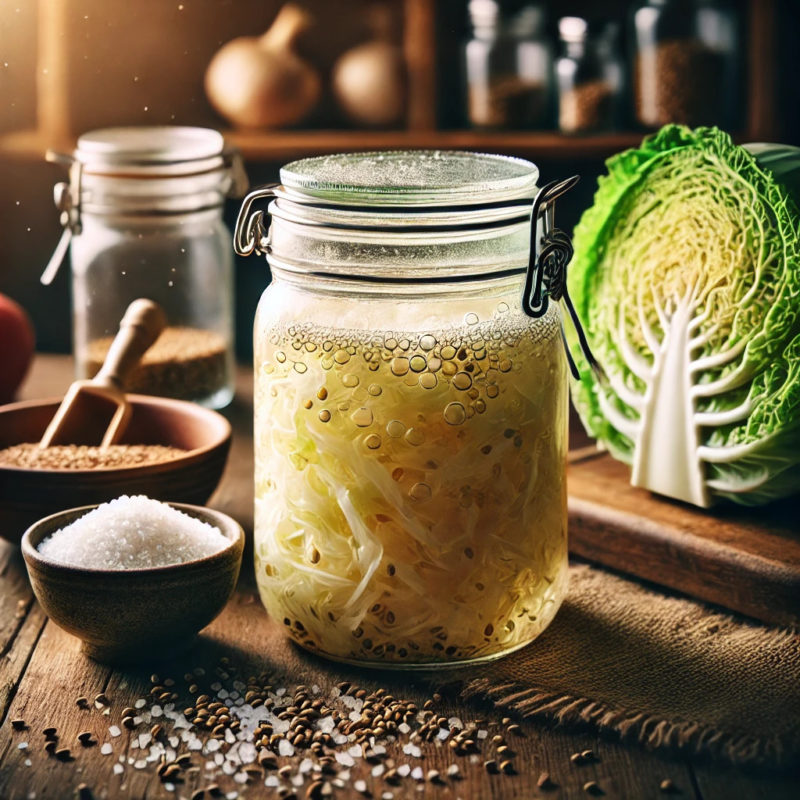Introduction
Fermentation has been an essential food preservation and enhancement method for thousands of years. While cultures worldwide have relied on fermentation for its ability to improve flavor, texture, and shelf life, recent research has uncovered its profound impact on health, particularly gut health. This article explores the latest scientific findings on how fermented foods influence the gut microbiota and overall well-being.

Understanding Fermentation
Fermentation is a metabolic process that involves the conversion of sugars into acids, gases, or alcohol. This process is driven by microorganisms such as bacteria, yeast, and molds. Common fermented foods include yogurt, kefir, sauerkraut, kimchi, miso, and kombucha. These foods are rich in probiotics, live microorganisms that provide health benefits when consumed in adequate amounts.
Gut Health and Its Importance
The gut microbiota consists of trillions of microorganisms, including bacteria, viruses, fungi, and other microbes that reside in the digestive tract. This diverse community plays a vital role in digestion, immune function, and overall health. A balanced and diverse gut microbiota is crucial for optimal health, influencing everything from nutrient absorption to mental health.

Key Research Findings
Study 1: Probiotics and Gut Microbiota Diversity
A 2021 study published in the journal Cell investigated the effects of fermented foods on gut microbiota diversity. The researchers conducted a randomized controlled trial with 36 healthy adults who were assigned to either a diet rich in fermented foods or a diet rich in fiber for 10 weeks. The study found that the group consuming fermented foods showed a significant increase in microbiota diversity and a decrease in inflammatory markers.
Methodology and Results
Participants in the fermented foods group consumed yogurt, kefir, fermented vegetables, kombucha, and kimchi. Stool samples were analyzed before and after the intervention. The results showed an increase in the diversity of gut microbiota, which is often associated with better health outcomes. In contrast, the high-fiber diet group did not show a similar increase in diversity, although it did result in improved carbohydrate metabolism.
Reference: Wastyk, H. C., Fragiadakis, G. K., Perelman, D., Dahan, D., Merrill, B. D., Yu, F. B., … & Sonnenburg, J. L. (2021). Gut-microbiota-targeted diets modulate human immune status. Cell, 184(16), 4137-4153.e14. DOI: https://www.cell.com/cell/fulltext/S0092-8674(21)00754-6
Study 2: Fermented Foods and Immune Function
A study published in Nutrients in 2020 explored the role of fermented foods in enhancing immune function. The researchers reviewed multiple studies examining the interaction between fermented foods and the immune system, particularly how probiotics in these foods can modulate immune responses by influencing the gut microbiota.
Methodology and Results
The review highlighted that probiotics in fermented foods, such as Lactobacillus and Bifidobacterium species, can enhance the gut barrier, reduce inflammation, and improve the immune response. These effects were linked to the production of short-chain fatty acids (SCFAs) and the modulation of cytokine production, which are crucial for maintaining a balanced immune system.
Reference: Sęk, M., & Witkowska, A. M. (2020). The potential of fermented food products in the prevention of diseases with inflammatory background. Nutrients, 12(7), 1925. DOI: https://www.mdpi.com/2072-6643/12/7/1925
Implications of the Research
These studies underscore the significant impact of fermented foods on gut health and immune function. By promoting a diverse and balanced gut microbiota, fermented foods can support various aspects of health, including digestion, immunity, and mental well-being.
Why Gut Health Matters
A healthy gut microbiota is essential for digestion, nutrient absorption, and immune function. The gut microbiota helps break down complex carbohydrates, produce essential vitamins, and generate short-chain fatty acids (SCFAs), which are vital for maintaining gut integrity and overall health. Moreover, the gut is home to a substantial portion of the immune system, interacting closely with the gut microbiota to protect against pathogens and maintain immune balance.
Mental Health and the Gut-Brain Axis
The connection between gut health and mental well-being is an area of growing research, often referred to as the gut-brain axis. The gut microbiota produces neurotransmitters like serotonin and dopamine, which play crucial roles in mood regulation and cognitive function. Disruptions in the gut microbiota have been linked to mental health disorders such as depression and anxiety. By fostering a healthy gut microbiota, fermented foods may contribute to better mental health outcomes.
Practical Applications
Incorporating Fermented Foods into Your Diet
Given the benefits of fermented foods, integrating them into your daily diet can be a straightforward and effective strategy to enhance gut health. Here are some practical tips:
- Start Slowly: If you’re new to fermented foods, introduce them gradually to allow your gut to adapt.
- Diversify Your Intake: Consume a variety of fermented foods, such as yogurt, kefir, sauerkraut, kimchi, and kombucha, to benefit from different probiotic strains.
- Homemade Fermentation: Making your own fermented foods can be both rewarding and cost-effective. Simple recipes like homemade yogurt or sauerkraut are excellent starting points.
- Pair with Prebiotic-Rich Foods: Complement fermented foods with prebiotic-rich foods such as garlic, onions, and whole grains to nourish the beneficial bacteria in your gut.

Sample Recipes
1. Homemade Sauerkraut
Ingredients:
- 1 medium cabbage
- 1 tablespoon sea salt
- 1-2 teaspoons caraway seeds (optional)
Instructions:
- Finely shred the cabbage and place it in a large bowl.
- Add the sea salt and massage the cabbage for about 10 minutes until it releases its juices.
- Pack the cabbage tightly into a clean jar, ensuring it’s submerged in its juices.
- Cover the jar with a cloth and secure it with a rubber band.
- Let it ferment at room temperature for 1-4 weeks, tasting occasionally until it reaches your desired flavor.
2. Homemade Yogurt
Ingredients:
- 4 cups milk (whole or 2%)
- 2 tablespoons plain yogurt with live cultures
Instructions:
- Heat the milk in a saucepan until it reaches 180°F, then let it cool to 110°F.
- Stir in the plain yogurt.
- Pour the mixture into a clean container and cover it.
- Keep the container in a warm place (around 110°F) for 6-12 hours, until it thickens and develops a tangy flavor.
- Refrigerate before serving.
Conclusion
Fermented foods provide a natural and delicious way to support gut health. The scientific evidence highlights their potential to enhance gut microbiota diversity and strengthen the immune system. By incorporating a variety of fermented foods into your diet, you can take proactive steps toward better digestion, improved immunity, and overall well-being. As research continues to uncover the health benefits of fermented foods, they remain an invaluable addition to a balanced and nutritious diet.
References
- Wastyk, H. C., Fragiadakis, G. K., Perelman, D., Dahan, D., Merrill, B. D., Yu, F. B., … & Sonnenburg, J. L. (2021). Gut-microbiota-targeted diets modulate human immune status. Cell, 184(16), 4137-4153.e14. DOI: https://www.cell.com/cell/fulltext/S0092-8674(21)00754-6
- Sęk, M., & Witkowska, A. M. (2020). The potential of fermented food products in the prevention of diseases with inflammatory background. Nutrients, 12(7), 1925. DOI: https://www.mdpi.com/2072-6643/12/7/1925
- Harvard T.H. Chan School of Public Health. (2020). Fermented foods and health. Link.
- Marco, M. L., Heeney, D., Binda, S., Cifelli, C. J., Cotter, P. D., Foligné, B., … & Hutkins, R. (2017). Health benefits of fermented foods: microbiota and beyond. Current Opinion in Biotechnology, 44, 94-102. DOI: https://www.sciencedirect.com/science/article/pii/S0958166916302935
This site is a participant in the Amazon Services LLC Associates Program and contains affiliate links to products. We may receive a commission for purchases made through these links.
[…] Fermented foods are now recognized for their role in supporting gut health, as they contain probiotics—live bacteria that are beneficial for the digestive system. Probiotics help maintain a healthy balance of gut flora, which is essential for digestion, immune function, and even mental health. Studies have shown that a healthy gut microbiome can reduce the risk of chronic diseases, improve mood, and enhance overall well-being. […]